Epirotiki Lines the early cruise ships
Please Note:
Firefox and some other search engines are
not suitable – Use “Internet
Explorer” for this page to load
perfectly!

Click
the logo above to reach the ssMaritime FrontPage for News Updates &
“Ship of the Month”
With
Reuben Goossens
Maritime
Historian, Cruise‘n’Ship Reviewer & Author
Please
Note: All ssMaritime and other related maritime/cruise sites are 100%
non-commercial and privately owned. Be assured that I am NOT associated with
any shipping or cruise companies or any travel/cruise agencies or any other
organisations! Although the author has been in the passenger shipping industry
since 1960, although is now retired but having completed over 700 Classic Liners and Cargo-Passengers Ships
features I trust these will continue to provide classic ship enthusiasts
the information the are seeking, but above all a great deal of pleasure!
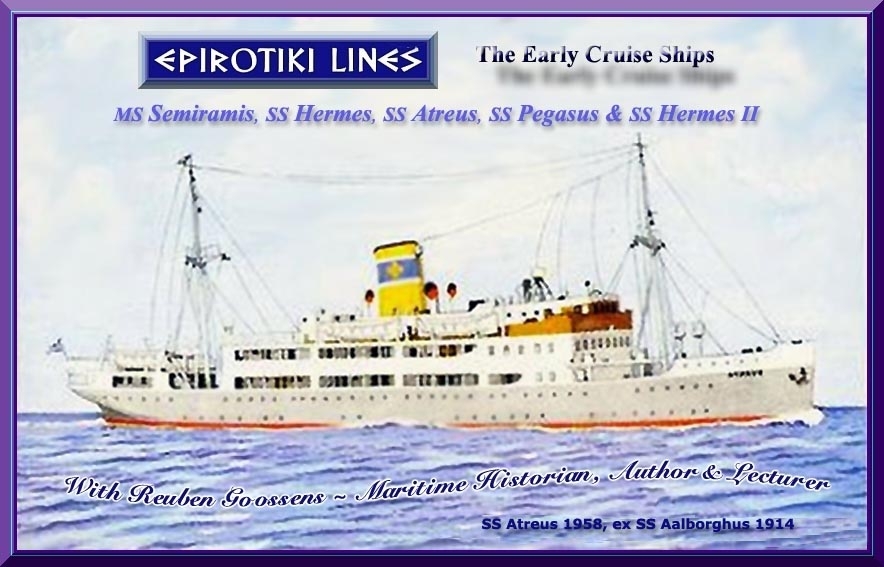
Page Two
The
Early Cruise Ships
SS
Hermes 1955, SS Atreus 1958, SS Pegasus & Hermes
II 1960
Ships
name and date obtained by Epirotiki Lines.
Introduction:
Welcome to a
new feature covering the very early days of long established Epirotiki Lines
purchasing second hand ships in order to enter a brand new market of operating
a cruise service around the Greek Islands, which they were the very first to
establish!
This is the
second page and the Epirotiki feature and it contains details of four ships
obtained between 1955 to 1960. Sadly I have very
little to no interior details of the ships listed on this page, however should
I locate brochures and deck plans of these in the future I will add them
online, all being well! But, as you you will have
seen on Page One and Page Three that there are ample photographs as well as
comprehensive deck plans, and the same applies for the final three ships shown
on Page Four!
I sincerely
trust that you will enjoy this feature for I was a friend of the late Mr.
George Potamianos for the last company he owned was “Classic
International Cruises” that had an amazing fleet of ships, on which I
sailed on a good number of times, such as the wonderful MV Funchal and the
amazing MV Athena! In fact I was to meet him in Lisbon
Portugal when the Athena was
to be in port, whilst I was on yet another voyage from Australia to Portsmouth
England, however, sadly he had fallen very ill and was rushed to
hospital. Tragically, my dear friend George Potamianos passed away, before we reached The
United Kingdom, less than a week later. There is a special page
online (Page Five) that Honours him and his countless achievements!
****************************
SS Hermes I, ex SS
Jupiter 1915:
In January
1915, Lindholmens Shipyard in Gothenburg and the
2,511 GRT (Gross Registered Tons) SS Jupiter (II) was delivered to the Bergen Line
and she was twice the size of previous the ships on the Bergen to Newcastle
service. She remained on this service until the Jupiter was chartered by the
British Government in March 1918 at a cost of £30,000 per year, with a
replacement cost that was set at £200,000. She was to continue a service
between Aberdeen and Bergen but now with a British crew and flying
the British flag, with priority guaranteed in a British shipyard for building a
replacement should Jupiter meet with an unfortunate accident. Normal regular
Danish services recommenced by the SS Jupiter on January 18, 1919 and she
sailed on until the 1930s.
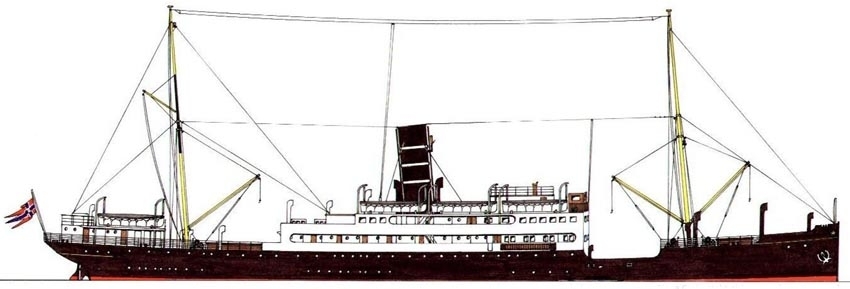
Here
we see a line drawing of a fine small ship, the SS Jupiter
In
1931 the Jupiter had a cooling system installed and facilities of the Third
Class were upgraded. Then in 1937 the Jupiter was to operate on the Fjord
service to Trondheim in Norway and she was sent to Rotterdam for a refit.
However with
WWII having arrived, the Nazis invaded Denmark and in 1940 the German
seized the Jupiter for the use as a residential ship for Norwegian prisoners of
war. Then from August 1940 she was used as a German Troop Ship and as from 1944
she officially sailed under the German flag.
Finally
at the end of the war was the Jupiter was home in Copenhagen and on June 15, 1945 she was
returned to the Bergen Line. She was given a renovation in Gothenburg and from
February 1946 she retuned back on the Fjord service to Trondheim. The problem for the Bergen Line
was that from the time the Jupiter was built she was the largest and most
luxurious ship in the Hurtigruten (coastal) fleet, thus she had a major
disadvantage of higher operating costs.
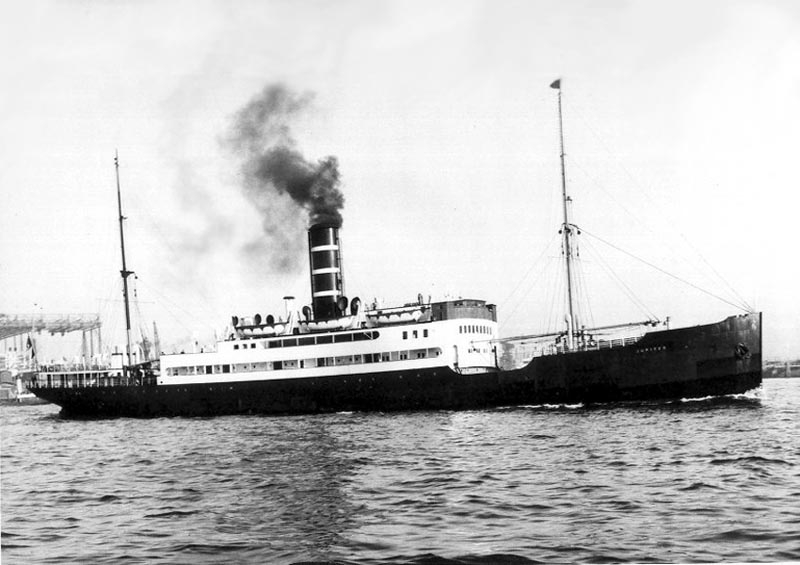
An
excellent photograph of the SS Jupiter seen in the early 1950s
Then
from 1953 she operated on the more lucrative summer service from Antwerp to Newcastle,
whilst during the winter months she would operate the popular coastal services
to Trondheim.
However, finally the time had come in 1955 that the Company decided to dispose
the 40 year old coastal liner and placed her on the market and she soon found a
buyer.
It was on
September 9, 1955 that Epirotiki Lines purchased her and duly renamed her
“Hermes.” She was sent to a shipyard to be refitted into a cruise
ship when completed Two of her forward decks below the Bridge were lengthened
and her funnel top was rounded nicely and shortened a little and she was given
the traditional Epirotiki livery, but the rest of her externally retained much
as she was. Internally there had been many changes, but sadly I have not been
able to find the details to date.
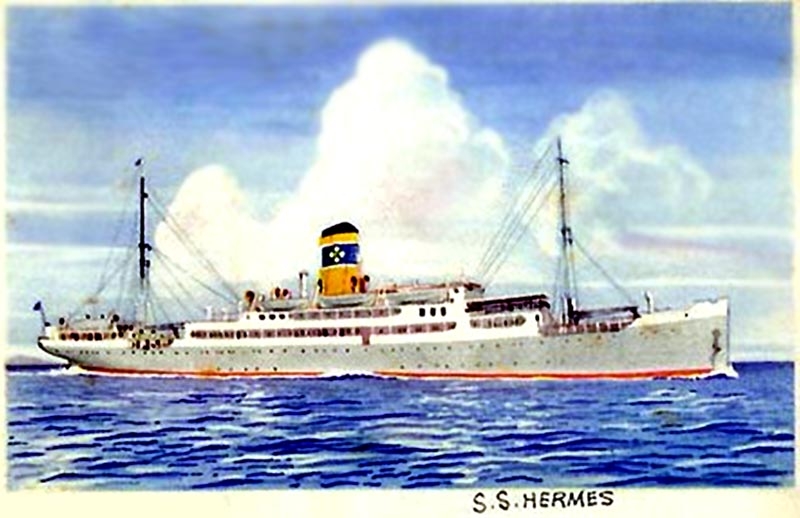
This
is an early Epirotiki Postcard of the SS Hermes, although it was badly damaged
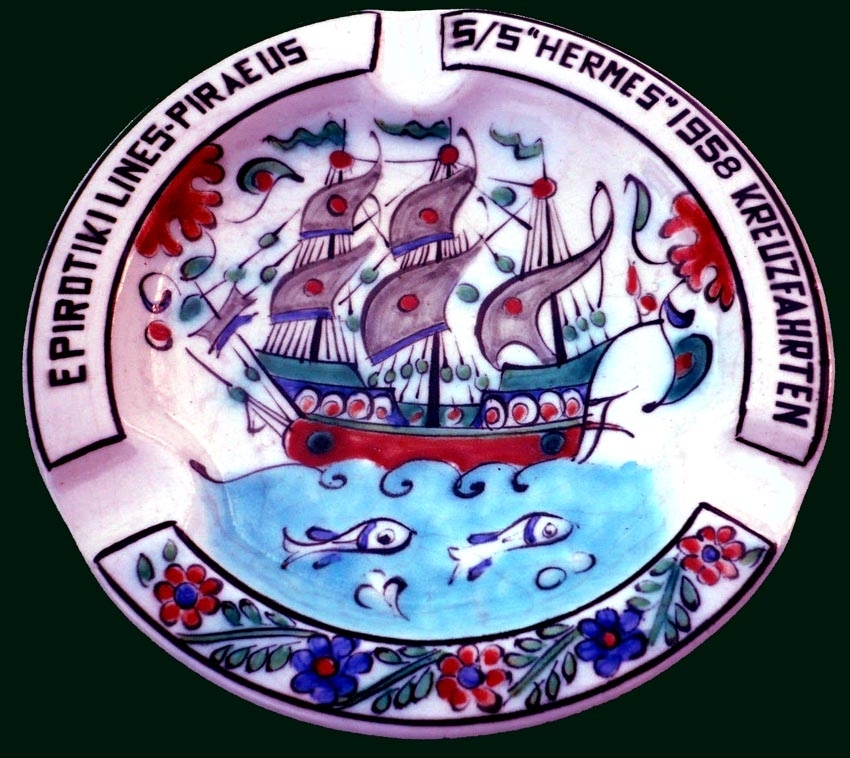
This is a very rare German
Souvenir obtained on the wonderful SS Hermes, a decorative plate dated 1958
With
the ship doing very well sailing together with the Semiramis and the newly
acquired Atreus, Epirotiki decided to give the Hermes a comprehensive refit,
thus she was sent to Piraeus
where the work commenced. However as interior modernisation was well on the
way, suddenly on March 4, 1960 a fire started that rapidly involving the entire
ship and she was completely gutted. With the completely destroyed ship having
been sold, in December of that year, the wreck was towed to Split
in Croatia
where she was broken up.
1. SS Jupiter 1915 to 1955 & 2. SS Hermes I 1955 to
1960 Specifications:
Builder: Lindholmens
Shipyard, Gothenburg Denmark.
Hull No: 423.
Sold
to: Epirotiki
Lines September 1955, renamed SS Hermes.
Call
Sign’s: MSTR
& LEBA.
Tonnage: 1. 2,511 as built – 915 Net.
. 2. 2,652 GRT
as SS Hermes.
Length: 93m
Breadth: 12.7m
Draught: 5.7m
Engines: Triple
Expansion Steam Engines by the builder. 3,000 BHP.
Speed: 15.5 Knots.
Passengers: 2. 170.
Fate: During a
refit at Piraeus
a gutted by fire & destroyed on March 4, 1960.
. Broken up at Split in Croatia.
****************************
SS Atreus, ex SS Aalborghus & Frederikshavn
1914:
Of all the
passengers ships in the Epirotiki fleet the SS Atreus is the oldest of their
small cruise ships. Of course these ships were generally obtained as second
hand tonnage, being small ships that were sturdy, mechanically sound and a
worthwhile investment, thus these were all ships that Epirotiki were able to
rebuild and refit into worthwhile and a comfortable cruise ships that offered
the very best of food and service!
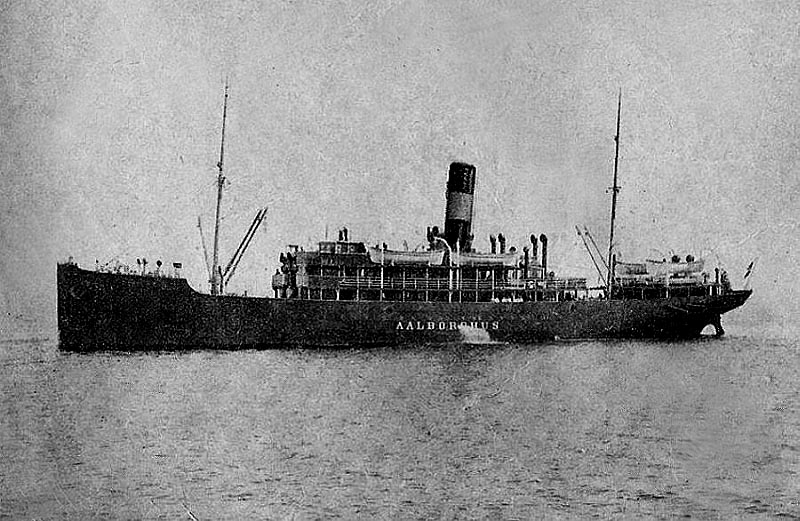
Here
we see a very old photo of the D.F.D.S. coastal ship the SS Aalborghus as she was
built in 1914
I
am sorry for the quality, but photography in 1914 was not the best as yet!
The
SS Atreus was originally built in 1914 for “D.F.D.S” or “Det Forenede Dampskibs-Selskap
A/S” of Copenhagen.
The 1,478 GRT (Gross Registered Ton) ship was built, launched with the name
“Aalborghus” and she was placed on the Frederikshavn to Oslo service. However, it
soon became apparent that the ship required considerable upgrading and she was
given an extensive refit as well as some external changes.
Then on May
23, 1936 she entered the Elsinore Iron Ship & Machine Construction Company,
to be completed rebuilt and when completed she was renamed;
“Frederikshavn.”
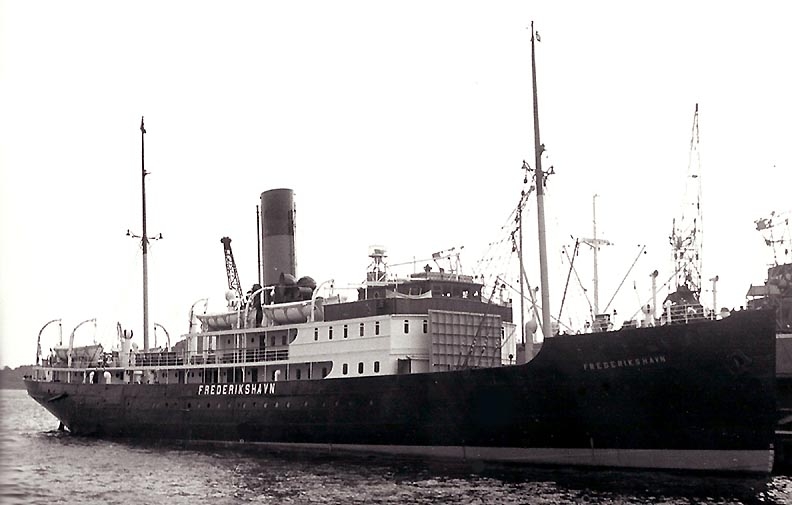
Here
we see the just rebuilt and renamed SS Frederikshavn, and a very smart looking
ship whilst in port
Ten
years later, in 1946 she was placed on a new service and she commenced
operating between Copenhagen and Oslo, working together
with the newer and much larger ship, the 3,119 ton MS Kronprins
Olav.
However, in
1958, at the age of 44 years the company decided to sell her and Epirotiki
Lines realised that she was a solid and a very sound ship, when she arrived in
Piraeus she was given a comprehensive refit and a partial rebuild making her
suitable for cruise duties. She offered accommodations for around 464
passengers in twin bedded cabins most of which were convertible into day rooms
as the beds folded away and became sofas. However some cabins had one or two
upper Pullman beds. Like The
Semiramis, this ship had modern and most attractive Lounges, Bars and a
swimming Pool and a fine Dining Room, etc.
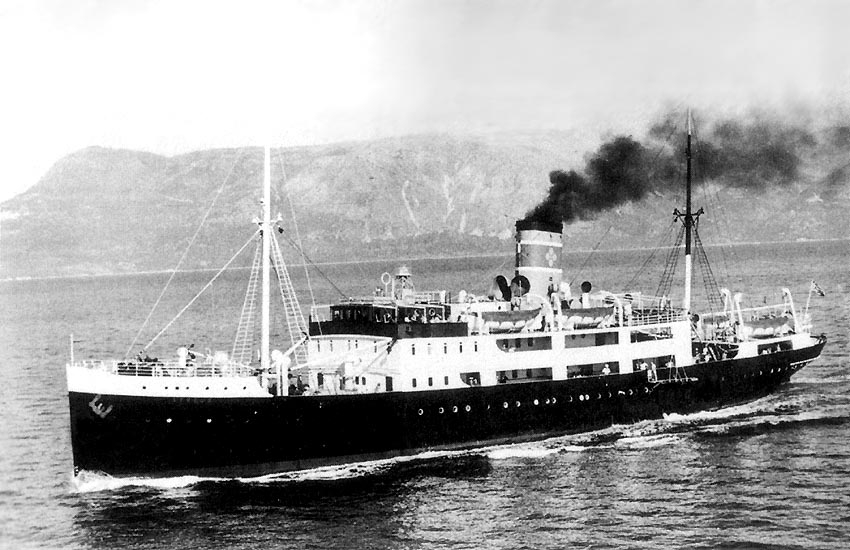
Above
& below: SS Atreus commenced her days having been
modernised but still with a black hull
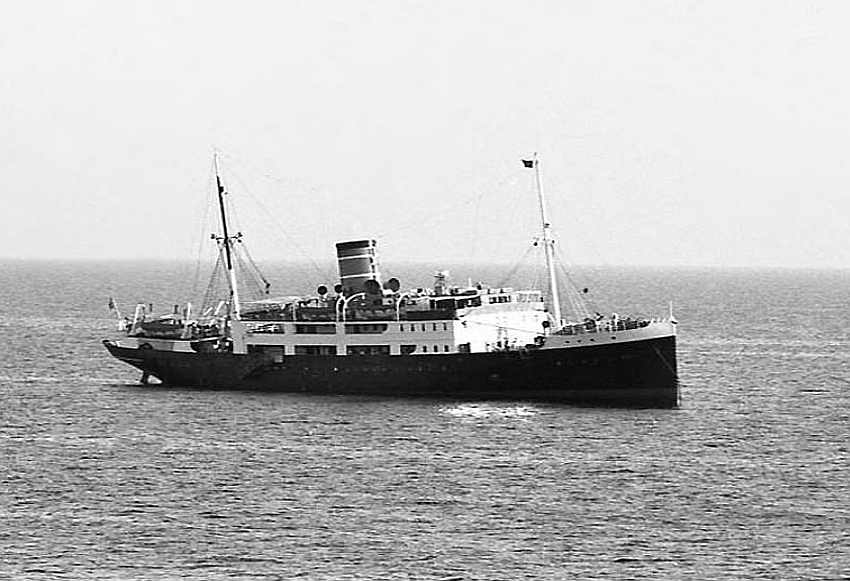
As
Epirotiki worked so closely in conjunction with the “Hellenic National
Tourist” Office and operated various round cruises to the Greek Islands
and Eastern Mediterranean the SS Atreus was placed
on the following three services:
1. Piraeus,
Corfu, Patras, Brindisi
and return. 2. Piraeus, Calymnos, Cos, Rhodes and
return. 3. Piraeus to Herakleion, but
return via Rethymnon and Chania to Piraeus.
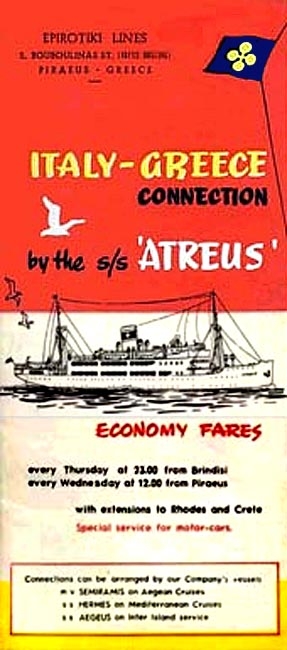
An Epirotiki Brochure
containing fares for SS Atreus
The SS Atreus
became Epirotiki Lines very first Passenger Cruise ship that had facilities to
transport a good number of passenger cars, but she was essentially a cruise
ship. She proved to be very popular indeed and operated a service that
connected with three other ships, should passengers extend their voyages. The
Atreus was greatly loved and thus very soon she was given a further refit as
well as a livery change featuring Epirotiki Lines traditional colours.
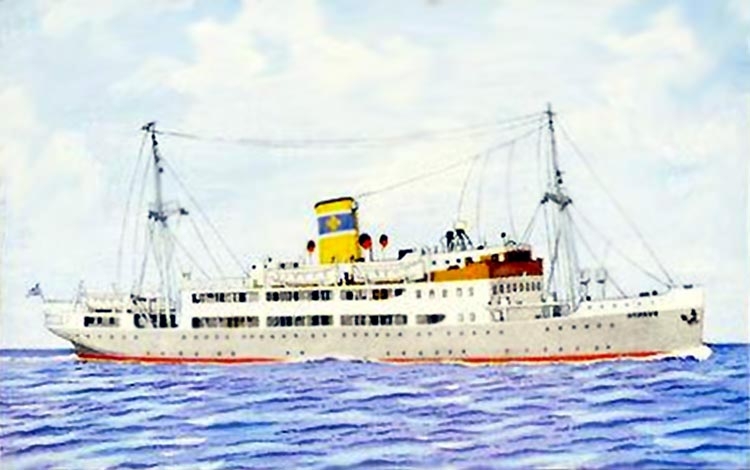
Here
is a new Epirotiki postcard of the SS Atreus after her refit and she is finally
sailing in the Epirotiki livery
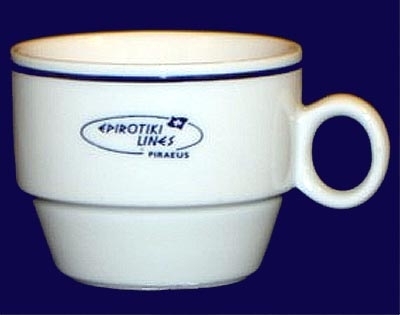
This is a cup used onboard the SS
Atreus in the 1960s
SS
Atreus continued on her services for a total of ten years, but in 1968 it was
decided by Epirotiki Lines that with their newer acquisitions that regrettably,
this delightful, but aging ship required to be retired and therefore she was
laid up in the Bay of Piraeus and placed on the market. However, as time went
by there were no buyers for the old girl, thus sadly she was finally sold to an
Italian ship breaker who took her to La Spezia in 1970 where she was duly broken up, aged a
respectable 56 years.
1. SS Aalborghus - 2. SS Atreus Specifications:
Built
by: Burmeister
& Wain Shipbuilding,
Copenhagen.
Yard No: 296.
Keel laid down: December
6, 1913.
Launched: April 3, 1913.
Completed: June 4, 1914.
Tonnage: 1. 1,478.
. 2. 1,554.
Length: 77.6m - 254.6ft.
Beam: 11.8m 38.7ft.
Draught: 7.5m - 24.8ft.
Engines: B&W triple
expansion steam engines, 1,750 BHP.
Propeller: One.
Speed: 13.5 knots.
Passengers: 1.
142 First, 94 Second Class & 250 deck passengers.
. 2. 464 One Class - SS Atreus.
Crew: 1. 38.
. 2. 170.
****************************
SS Pegasus and Hermes
II, ex SS Princess Elizabeth & Princess Joan 1930:
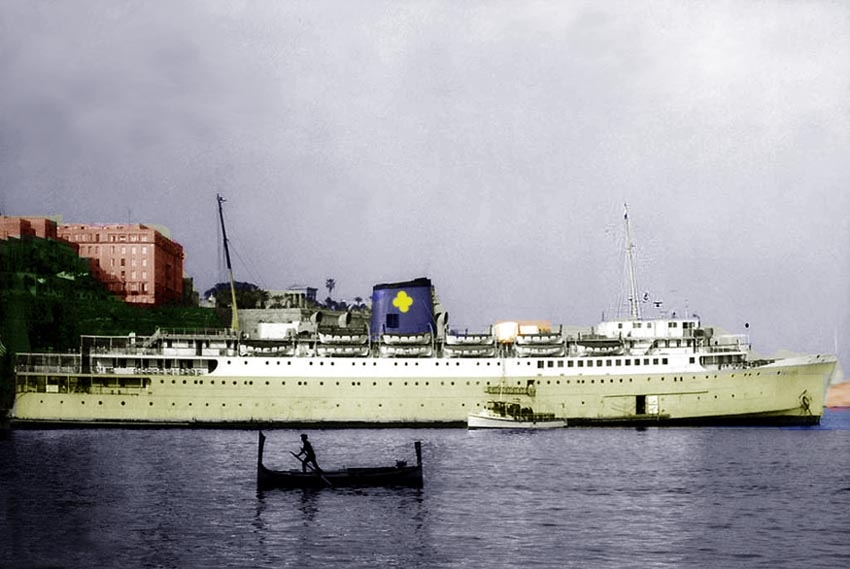
The
SS Pegasus seen in her later years
Part
One - The SS Princess Elizabeth and Princess Joan:
Pegasus and
Hermes II were built as two “Canadian Pacific Railway Company” (CP)
ships, the SS Princess Elizabeth and Princess Joan, both being passenger car
ferries, which were completed in 1930. Their original builders were Fairfield
Shipbuilders of Govan (Glasgow) and they operated a service between Seattle, Victoria
and Vancouver B.C., as well as other services. However, they were withdrawn by
CP in 1959.
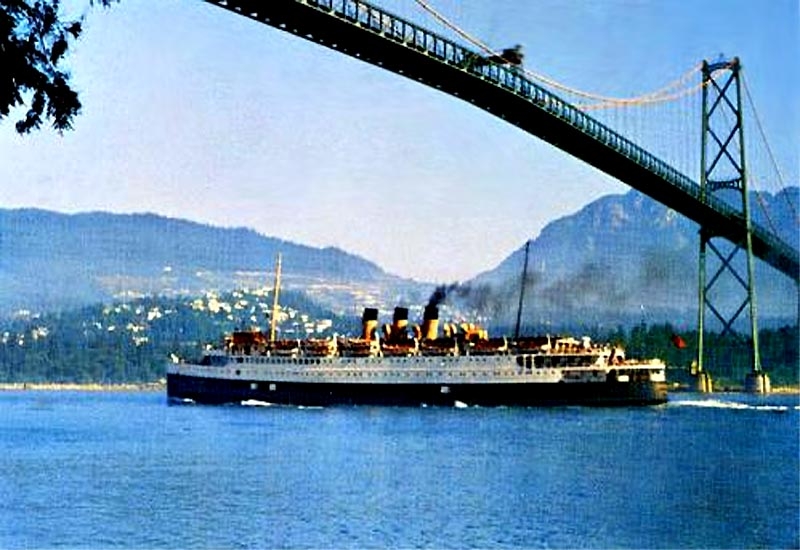
Here
we one of Canadian Pacific’s three funnel ships, the SS Princess Joan
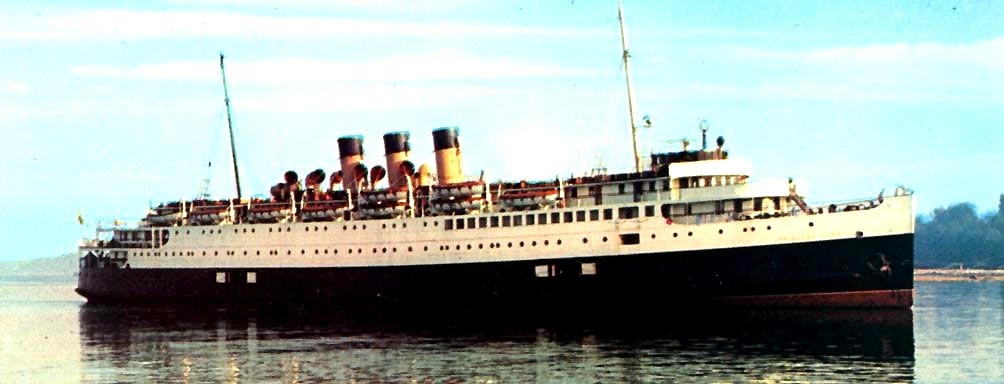
A
close up of these fine and well built ships, for they may be ferries, but they
certainly stood out in a crowd!
SS Pegasus & Hermes:
These two
identical ships were built with three funnels, but when both ships were
purchased by Epirotiki Lines in 1960 they were given an extensive refit and
partial rebuild. The SS Princess Elizabeth was renamed the
“Pegasus” and SS Princess Joan became the “Hermes II.”
Upon completion their three funnels had gone and one larger, but shorter funnel
had replaced them and although these two ships were externally identical in
appearance, however internally they had completely different layouts.
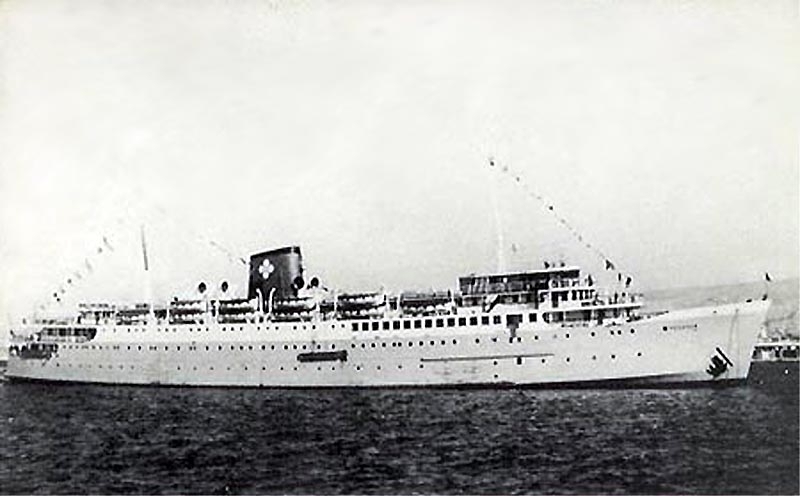
SS
Pegasus is seen here in her early days as a Passenger Car Ferry,
and did not look as good as she did in the past
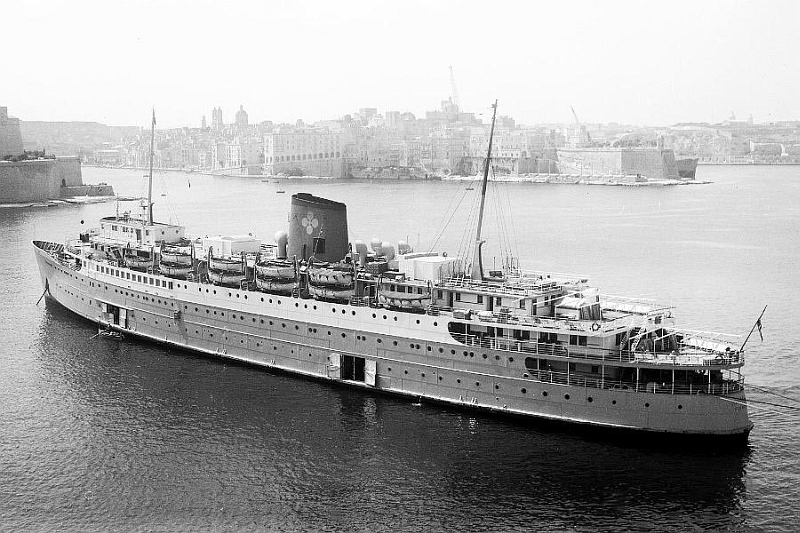
The
Pegasus having had a further refit is looking better; she is seen arriving in Venice with her garage
doors open
Both
ships retained the large garage for cars that entered through large side doors
in the side of the hulls, which can be clearly seen on the ships photographs.
Both The SS Pegasus and the Hermes II commenced service in 1961.
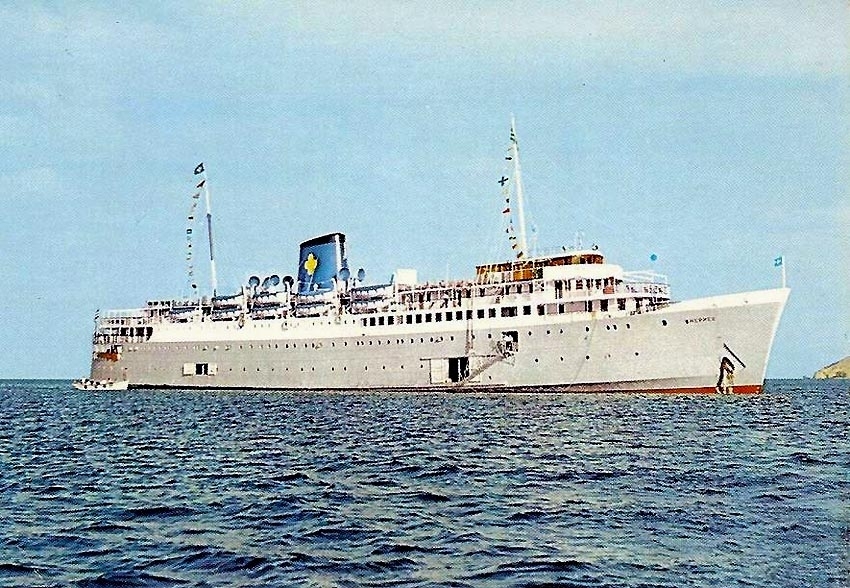
Here
we see that she had SS Hermes II being the name on her bow, but she was
marketed just as the “SS Hermes”
They commenced
as Three Class ships, operating the lucrative Passenger Car Ferry service
between Italy, Greece, Cyprus
and Israel.
In due course they were also operated as cruise ships.
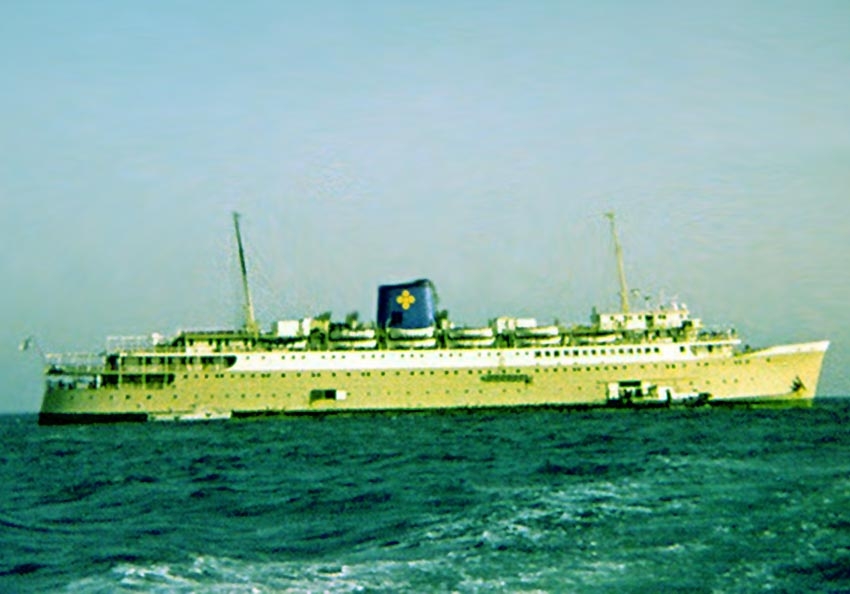
The
SS Pegasus is seen during one of her cruises
However,
in the seventies both the Pegasus and Hermes spent time as accommodation ships
in Scotland.
The Hermes was the first to arrive but she was sold to the breakers in 1974.
The Pegasus had been renamed the “Highland Princess” for her new
roll in 1973, but her accommodation duties concluded early in 1976, and she was
sold to the “Bruges Ship Breakers” in
Belgium, where she arrived on March 19, 1976.
1. SS
Princess Elizabeth & 2. Princess Joan Specifications:
1.
CP - 2. Epirotiki.
Built at: Fairfield
Shipbuilders & Engineering Co., Govan,
Scotland -1930.
Yard: 1. 638.
. 2. 639.
Launched: 1. January 15, 1930.
. 2. February 4, 1930.
Length: 107.70m –
353.3ft.
Breadth: 15.87m – 52.1ft.
Draught: 7.67m - 25ft.
Tonnage: 5,251 GRT, 3,023 Net,
772 Dwt.
Engines: Quadruple-Expansion
Steam Engines, by the builder 3,600 BHP.
Propellers: Two.
Speed: 16.5 knots.
Passengers: 1.
1,000 berthed and seated.
. 2. 180 First Class, 140 Cabin Class & 150 Tourist Class.
****************************
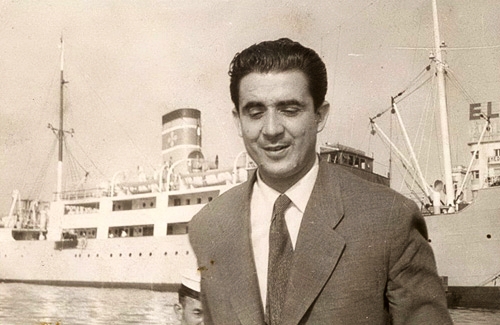
Here
we see Mr. Giorgos Potamianos standing in front of the SS Atreus, being the
second ship obtained in the new
passenger fleet purchased in the 1950s and the 1960s
Epirotiki
Index:
Page One
… MV
Semiramis the first ship!
Page One B … MV
Semiramis Deck Plan.
Page
Two … The
Early Ships - SS Hermes, Atreus, Pegasus & Hermes II.
Page
Three … MS
Argonaut.
Page
Three B … MS
Argonaut Deck Plan.
Page
Four … MTS Jason.
Page Four B … MTS
Jason, later MS Ocean Odyssey - Deck Plans.
Page
Five … MTS Orpheus II.
Page Six … MTS Apollon II.
Page Six B
… MTS
Orpheus II & Apollon II - Deck Plans. “
“Blue Water Liners
sailing to the distant shores.
I watched them come, I watched them go and I watched them die.”
****************************
Return
to the ssMaritime
Main INDEX
Where
you will discover over 700 Classic Passenger & Passenger-Cargo Liners!
ssMaritime.com
& ssMaritime.net
Where
the ships of the past make history & the 1914 built MV Doulos Story
Please
Note: ssmaritime and associated sites are 100%
non-commercial and the author seeks no funding or
favours of any shape or form, never have and never will!
Photographs on ssmaritime and associate pages are by the author or from the
author’s private collection. In addition there are some images that have
been provided by Shipping Companies and private photographers or collectors.
Credit is given to all contributors. However, there are some photographs
provided to me without details regarding the photographer/owner concerned. I
hereby invite if owners of these images would be so kind to make them-selves
known to me (my email address may be found on www.ssmaritime.com only), in order that due credit
may be given.
This
notice covers all pages, although, and I have done my
best to ensure that all photographs are duly credited and that this notice is
displaced on each page, that is, when a page is updated!
ssMaritime is owned &
© Copyright by Reuben Goossens - All Rights Reserved




















